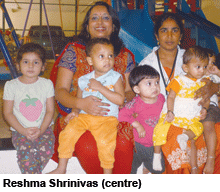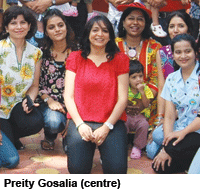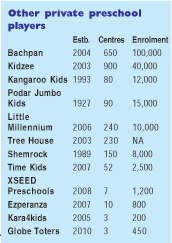Until recently preschool education for children in the age group two-six was an area of darkness in Indian education. But with a plethora of studies in brain mapping and cognition indicating that carefully conceptualised and designed early childhood education (ECE) provides infants with a strong foundation to make the best of their primary, secondary and ultimately higher education, India’s ambitious, outward-looking middle class is taking to ECE in a big way. The rise of this new awareness combined with the happy circumstance that the preschool sector has not yet attracted the heavy regulatory hand of the Central, state or local governments, has stimulated numerous education entrepreneurs to promote an estimated 50,000 preschools countrywide, mainly under the franchise model.
Within this hitherto neglected sector which is all set to become a big business with annual revenue expected to cross Rs.5,000 crore in 2012, several preschool educators and ECE companies are setting the pace and emerging as models for the nation’s multiplying preschool entrepreneurs. Brief profiles of the country’s leading ECE providers are given below.
EuroKids International
.gif) Within the space of a decade since it promoted its first two preschools in Mumbai on a pilot basis, EuroKids International Ltd (EIL) has established itself as India’s largest preschool education company with 29 owned and operated, and 783 franchised institutions in 280 urban habitations countrywide. With an aggregate enrolment of 55,000 pupils instructed by 4,000 well-trained teachers, EIL has made standardised, high-quality, globally benchmarked preschool education available to hundreds of thousands of middle class households.
Within the space of a decade since it promoted its first two preschools in Mumbai on a pilot basis, EuroKids International Ltd (EIL) has established itself as India’s largest preschool education company with 29 owned and operated, and 783 franchised institutions in 280 urban habitations countrywide. With an aggregate enrolment of 55,000 pupils instructed by 4,000 well-trained teachers, EIL has made standardised, high-quality, globally benchmarked preschool education available to hundreds of thousands of middle class households.
Excerpts from an interview with Prajodh Rajan, chief executive of EIL
What would you say is the USP or outstanding contribution of Eurokids International?
When EuroKids commenced its operations a decade ago, preschools were operated by individuals and lacked basic infrastructure, equipment and developmentally appropriate curriculums. EIL was the first company to offer structured curriculums with child-centric features to preschool children. We introduced colourful, child-friendly classrooms, equipped them with child safe non-toxic toys and employed qualified early childcare educators specially trained by us. We take credit for leading the way into a completely unorganised market and creating a power brand in a hitherto unbranded space.
How satisfied are you with the pace of growth of Eurokids International?
It has been an extremely satisfying and exhilarating journey for EIL which has grown from two preschools to a vast network of 800 centres countrywide, which have thoroughly prepared 175,000 infants for school education. But our journey is far from over and we have miles to go…
How enabling are Central and state government policies for establishing new schools?
The preschool education sector is very fragmented with numerous unorganised preschools spread across the geographic span of India. The biggest reason for this is the absence of any kind of government regulations ruling this segment. However, rather than inviting government intervention, we have taken the onus upon ourselves and follow the general recommendations made by the Indian Academy of Paediatrics in Early Childcare & Education.
What are your future growth and development plans?
The potential offered by the preschool education sector is vast but it largely remains untapped because of low penetration. According to a recent study, preschool revenue is expected to register compound annual growth of 20 percent and is set to reach Rs.10,500-11,500 crore by 2014-15. At EuroKids, we would like to be a part of this growth story and consolidate our position as the largest and most preferred preschool brand in the country. We have drawn up a plan to add another 400 new EuroKids centres in the next two years and would like to take our successful concept to every town and city in India, SAARC and Middle East countries.
I Play I Learn
.gif) Arun Khetan, promoter-chief executive of the Mumbai-based New Age Knowledge Solutions (NAKS), is widely acknowledged as a pioneer of the franchise model under which over 3,500 contemporary and internationally benchmarked preschools have been rolled out countrywide. Former CEO of the Kidzee and Roots to Wings pre-school chains, in 2009 Khetan co-promoted NAKS which has franchised 135 preschools (tuition fees: Rs.16,000-40,000 per year) in 136 cities and towns with an aggregate enrolment of 1,800 children under the brand name of I Play I Learn.
Arun Khetan, promoter-chief executive of the Mumbai-based New Age Knowledge Solutions (NAKS), is widely acknowledged as a pioneer of the franchise model under which over 3,500 contemporary and internationally benchmarked preschools have been rolled out countrywide. Former CEO of the Kidzee and Roots to Wings pre-school chains, in 2009 Khetan co-promoted NAKS which has franchised 135 preschools (tuition fees: Rs.16,000-40,000 per year) in 136 cities and towns with an aggregate enrolment of 1,800 children under the brand name of I Play I Learn.
USP or outstanding contribution of I Play I Learn.
I believe we have neatly integrated love of learning into early childhood education through carefully designed play programmes. The brand name I Play I Learn connects play with the learning process.
How satisfied are you with the pace of growth of I Play I Learn?
In terms of external growth, establishing a pan-India network of 125 I Play I Learn franchised preschools within less than 30 months has been quite satisfying. However, what’s most gratifying is the heart-filled appreciation we receive from parents in all sections of society, who experience the joy and satisfaction of sending their children to I Play I Learn.
How enabling are Central and state government policies for establishing preschools?
Central and state government policies are age-old and desperately need to be improved. The fast-growth Indian economy needs a concerted focus on the education sector, and there is an urgent need for good schools with qualified teachers and modern pedagogies.
What are your future growth and development plans?
During the initial two years of our operations, we have been conceptualising, modelling, and developing the eco-systems of all our verticals and setting up franchisee/own centres. By the end of this financial year, we intend to add another 35-40 I Play I Learn preschools and hope to cross the magic figure of 540 schools with an enrolment of 35,000-40,000 students by 2015. Last but not least, we are preparing to further improve our services and launch our K-12 model Universal Minds Global Schools in the near future.
WeCare Learning
 An early childhood care and learning initiative widely welc-omed by India Inc is the establishment of in-house and off-site childcare centres for young children in the age group 0-4. With the twin phenomena of nuclear families and emergence of highly skilled women professionals in Indian industry and commerce, the need for day care centres managed by trained professionals is being fulfilled by Reshma Shrinivas, promoter-managing director of the Bangalore-based WeCare Learning Pvt. Ltd (estb.2008).
An early childhood care and learning initiative widely welc-omed by India Inc is the establishment of in-house and off-site childcare centres for young children in the age group 0-4. With the twin phenomena of nuclear families and emergence of highly skilled women professionals in Indian industry and commerce, the need for day care centres managed by trained professionals is being fulfilled by Reshma Shrinivas, promoter-managing director of the Bangalore-based WeCare Learning Pvt. Ltd (estb.2008).
Within three years of com-mencing operations, WeCare has grown exponentially and has established an excellent reputation for providing highly professional crèches and day care services to over 700 children in five wholly owned centres with an aggregate built-up area of 50,000 sq.ft. Moreover, the company has partnered with several blue-chip corporations including Accenture, GE, Cable & Wire-less, McAfee and SAP Labs, among others to establish in-house/off-site early childhood learning centres.
What is the USP of WeCare?
With the ever increasing number of working women and nuclear families especially in urban India, there is a huge need for early childcare centres especially for infants in the age group of 0-4 years. Discerning working parents highly value of quality early childcare centres that can nurture as well as stimulate their children’s overall development. WeCare is a pioneer in establishing child-friendly, spacious, hygienic, nurturing early childcare centres comparable with the best worldwide.
How satisfied are you with the pace of growth of WeCare?
Having established five centres in less than four years, our progress has been phenomenal — 100 percent growth year on year.
How enabling are Central and state government policies for establishing new schools?
Early childcare needs to be addres-sed by the government and recog-nised as an important part of pre-primary education for all sections of society.
What are your future growth and development plans?
Corporate India has recently begun to acknowledge the vital importance of quality on-site childcare centres as a powerful incentive for recruitment and retention of employees, especially women professionals. We intend to help corporates design and operate early childcare centres, making this a new line of business with great growth potential. Meanwhile we will continue to expand our operations in Bangalore and also establish WeCare centres in other south Indian cities.
Neev
.gif) The Bangalore-based Neev Group of four preschools are models of owned (as opposed to franchised) early childhood education, benchmarked with the world’s best. The first Neev preschool was promoted in 2005 by Kavita Sabharwal, a Harvard Business School alumna for the Lupin Foundation and since then, three others with an aggregate enrolment of 450 children instructed by 185 teachers have been established. Two of them are ranked among Bangalore’s Top 10 preschools in the EducationWorld-C fore Survey of Preschools 2011.
The Bangalore-based Neev Group of four preschools are models of owned (as opposed to franchised) early childhood education, benchmarked with the world’s best. The first Neev preschool was promoted in 2005 by Kavita Sabharwal, a Harvard Business School alumna for the Lupin Foundation and since then, three others with an aggregate enrolment of 450 children instructed by 185 teachers have been established. Two of them are ranked among Bangalore’s Top 10 preschools in the EducationWorld-C fore Survey of Preschools 2011.
What is the USP or outstanding contribution of Neev Schools to early childhood education?
Neev works with global best practices in education to achieve strong development for each child — through different-iation, integration and relevance. Basically we teach children to love to learn!
How satisfied are you with the pace of growth of Neev Schools?
I am satisfied but not done. This is a journey with an ever-receding frontier.
How enabling are Central and state government policies for establishing new schools?
Most government policies are challenging and complex. Education is no different with formulators of the RTE Act seeming to believe that private education should not exist. Indian education is over-regulated and undersupervised. It would be good if the government got out of controlling and did a better job at governing.
What are your future growth and development plans?
For the next couple of years, I see us remaining focused on strengt-hening people and processes in Bangalore with our existing presc-hools and setting up one or two ‘big schools’. We are also consi-dering doing something formal in teacher training because it is so hard to find talent, but that would probably be a medium-term goal.
Leapbridge International
 One of the most promising private initiatives in recent times is the promotion of three internationally benchmarked preschools in Pune under the name and style of Leapbridge International. Since the first Leapbridge International was established in 2009 by the Mumbai-based Navneet Publications India Ltd (estb.1959), a publicly listed company and well-known name in textbooks publishing, stationery and e-learning in Western India, the number of students in its three state-of-the-art preschools in Pune has grown to 250 mentored by 25 teachers.
One of the most promising private initiatives in recent times is the promotion of three internationally benchmarked preschools in Pune under the name and style of Leapbridge International. Since the first Leapbridge International was established in 2009 by the Mumbai-based Navneet Publications India Ltd (estb.1959), a publicly listed company and well-known name in textbooks publishing, stationery and e-learning in Western India, the number of students in its three state-of-the-art preschools in Pune has grown to 250 mentored by 25 teachers.
With ambitious plans to expand and move up the value chain by promoting fully integrated K-12 schools and diversifying into teacher education, Navneet Publications is set to make an impact on school education in India in the very near future. Preity Gosalia, director of academics and operations at Leapbridge International who has 17 years experience in pre-primary education was interviewed in Mumbai. Excerpts:
What is the USP of Leapbridge?
Several years of research has enabled us to design and develop age-appropriate curriculums based on Dr. Howard Gardner’s theory of multiple intelligences. Our education philosophy and curriculum has also been influenced by the Play Way pedagogy of the famous German educator Dr. Friedrich Froebel, and Maria Montessori. The teaching of Mahatma Gandhi who famously said that successful learning should involve head, heart and hand is also built into our curriculum.
How satisfied are you with the pace of growth of Leapbridge International?
Thus far, the journey within a society which doesn’t adequately understand the importance of professionally administered preschool education, has been challenging. However, the feedback from parents and the discernable learning improvement of our children makes us proud and satisfied with what we have achieved so far. We plan to multiply our company-managed Leapbridge International schools and also franchise preschools under the Leapbridge brand. Our target is to inaugurate 20-30 centres per year. Long term plans are to launch Leapbridge high schools and promote teacher training institutes.
